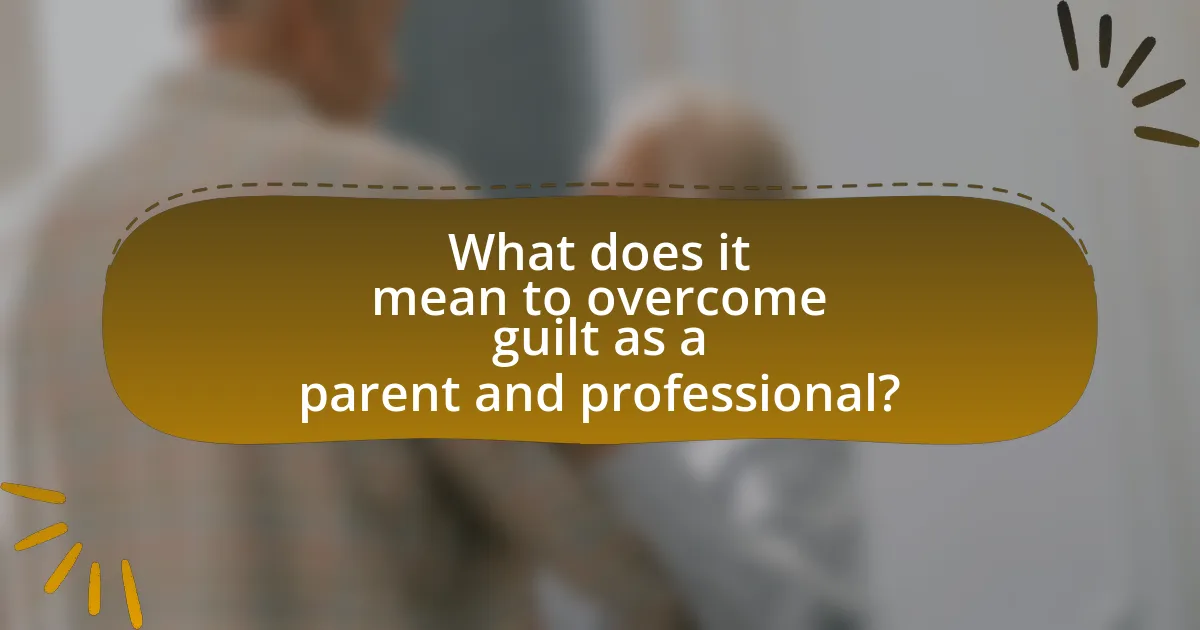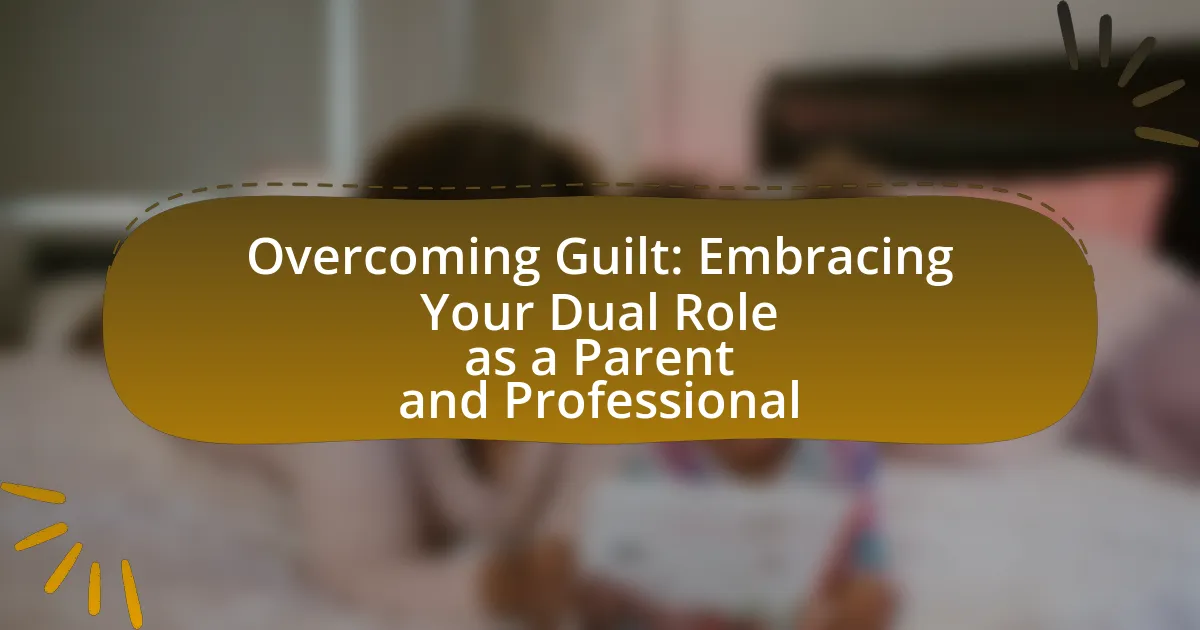The article focuses on overcoming guilt experienced by parents balancing their roles as caregivers and professionals. It explores how guilt manifests in working parents, common sources of this guilt, and the impact of societal pressures. The discussion includes strategies for managing guilt, such as self-compassion, mindfulness, and effective time management, while emphasizing the importance of addressing these feelings for improved mental health and family dynamics. Additionally, the article highlights practical tips for parents to create a supportive network and engage in self-care, ultimately fostering a healthier balance between work and family responsibilities.

What does it mean to overcome guilt as a parent and professional?
Overcoming guilt as a parent and professional means recognizing and addressing the conflicting demands of both roles without allowing feelings of inadequacy to hinder performance in either area. Parents often experience guilt when they feel they are not dedicating enough time to their children due to work commitments, while professionals may feel guilty for not being fully present at work due to family responsibilities. Research indicates that managing these feelings involves setting realistic expectations, practicing self-compassion, and prioritizing effective time management strategies. For instance, a study published in the Journal of Family Psychology highlights that parents who engage in open communication about their challenges tend to experience lower levels of guilt and higher satisfaction in both parenting and professional roles.
How does guilt manifest in the lives of working parents?
Guilt in the lives of working parents often manifests as feelings of inadequacy and anxiety regarding their ability to balance professional responsibilities with parenting duties. This emotional struggle can lead to stress, as parents may feel they are not dedicating enough time to their children or that they are failing in their roles at work. Research indicates that approximately 70% of working parents experience guilt related to their job commitments, which can negatively impact their mental health and overall well-being. This guilt can also result in overcompensation, where parents may try to make up for perceived shortcomings by overindulging their children or sacrificing personal time, further complicating their ability to maintain a healthy work-life balance.
What are common sources of guilt for parents balancing work and family?
Common sources of guilt for parents balancing work and family include the feeling of not spending enough quality time with their children, the pressure to meet work obligations, and the struggle to maintain a work-life balance. Parents often feel guilty when they miss important family events or milestones due to work commitments, which can lead to emotional distress. Research indicates that 70% of working parents report feeling guilty about not being present for their children, highlighting the pervasive nature of this issue. Additionally, the societal expectation to excel in both parenting and professional roles exacerbates these feelings of inadequacy, making it challenging for parents to navigate their dual responsibilities without guilt.
How does societal pressure contribute to feelings of guilt?
Societal pressure contributes to feelings of guilt by creating unrealistic expectations regarding personal and professional roles. Individuals often feel compelled to meet these standards, leading to self-judgment when they perceive themselves as falling short. For instance, parents may experience guilt for not spending enough time with their children due to work commitments, influenced by societal norms that prioritize family involvement. Research indicates that 70% of working parents report feeling guilty about balancing work and family life, highlighting the pervasive impact of societal expectations on emotional well-being.
Why is it important to address guilt in parenting and professional roles?
Addressing guilt in parenting and professional roles is crucial because unresolved guilt can lead to stress, anxiety, and decreased effectiveness in both areas. Research indicates that parents who manage their guilt effectively report higher levels of satisfaction and well-being, which positively impacts their children’s development and their professional performance. For instance, a study published in the Journal of Family Psychology found that parents who engage in self-compassion and address feelings of guilt are more likely to foster secure attachments with their children, enhancing emotional resilience. Therefore, addressing guilt not only improves personal mental health but also contributes to healthier family dynamics and professional success.
What impact does unresolved guilt have on mental health?
Unresolved guilt significantly negatively impacts mental health by contributing to anxiety, depression, and stress-related disorders. Individuals experiencing unresolved guilt often face persistent feelings of shame and self-blame, which can lead to a cycle of negative thinking and emotional distress. Research indicates that unresolved guilt can exacerbate mental health issues; for instance, a study published in the Journal of Affective Disorders found that individuals with high levels of guilt are more likely to experience depressive symptoms. This correlation highlights the importance of addressing unresolved guilt to improve overall mental well-being.
How can guilt affect relationships with children and partners?
Guilt can significantly strain relationships with children and partners by fostering feelings of inadequacy and resentment. When parents experience guilt, they may overcompensate by being overly permissive or intrusive, which can lead to confusion and boundary issues for children. Research indicates that parents who feel guilty about their work-life balance often struggle to engage meaningfully with their children, resulting in emotional distance and behavioral problems in kids (American Psychological Association, 2020).
In partnerships, guilt can create tension and miscommunication, as one partner may withdraw or become defensive, leading to unresolved conflicts. Studies show that guilt can hinder open dialogue, making it difficult for partners to express their needs and feelings, ultimately eroding trust and intimacy (Journal of Family Psychology, 2019). Thus, guilt negatively impacts both parenting and partnership dynamics, necessitating strategies to address and overcome these feelings for healthier relationships.
What strategies can help in overcoming guilt?
To overcome guilt, individuals can employ strategies such as self-compassion, reframing negative thoughts, and setting realistic expectations. Self-compassion involves treating oneself with kindness during difficult times, which has been shown to reduce feelings of guilt and promote emotional resilience. Reframing negative thoughts allows individuals to view situations from a different perspective, helping to alleviate guilt by recognizing that mistakes are part of the learning process. Setting realistic expectations helps prevent the pressure that often leads to guilt, as it encourages individuals to acknowledge their limitations and prioritize self-care. Research indicates that these strategies can significantly improve emotional well-being and reduce guilt-related distress.
How can mindfulness practices reduce feelings of guilt?
Mindfulness practices can reduce feelings of guilt by promoting self-awareness and acceptance of one’s thoughts and emotions. Engaging in mindfulness allows individuals to observe their feelings of guilt without judgment, which can diminish the emotional intensity associated with these feelings. Research indicates that mindfulness meditation can lead to decreased rumination and increased emotional regulation, helping individuals to process guilt more constructively. A study published in the journal “Mindfulness” by Keng, Smoski, and Robins found that mindfulness practices significantly reduce negative emotional states, including guilt, by fostering a non-reactive awareness of one’s experiences.
What role does self-compassion play in overcoming guilt?
Self-compassion plays a crucial role in overcoming guilt by allowing individuals to treat themselves with kindness and understanding during difficult times. This approach helps to mitigate feelings of shame and self-criticism, which often exacerbate guilt. Research by Neff (2003) indicates that self-compassion is associated with greater emotional resilience, enabling individuals to acknowledge their mistakes without harsh judgment. By fostering a supportive inner dialogue, self-compassion encourages individuals to learn from their experiences rather than dwell on guilt, ultimately promoting psychological well-being and healthier coping mechanisms.

How can parents embrace their dual roles effectively?
Parents can embrace their dual roles effectively by establishing clear boundaries between work and family time. This approach allows parents to focus fully on their professional responsibilities during work hours and dedicate quality time to their children when at home. Research indicates that setting specific work hours and creating a structured schedule can enhance productivity and reduce stress, leading to a more balanced life. For instance, a study published in the Journal of Family Psychology found that parents who actively manage their time report higher satisfaction in both their professional and personal lives. By prioritizing tasks and communicating openly with their employers and family members, parents can navigate their dual roles with greater ease and confidence.
What are the benefits of embracing both parenting and professional responsibilities?
Embracing both parenting and professional responsibilities enhances personal growth and fosters a balanced life. This dual engagement allows individuals to develop essential skills such as time management, multitasking, and emotional intelligence, which are beneficial in both personal and professional contexts. Research indicates that parents who work often report higher levels of satisfaction and fulfillment, as they can model responsibility and work ethic for their children, thereby positively influencing their development. Additionally, balancing these roles can lead to improved mental health, as engaging in work can provide a sense of purpose and achievement, while parenting offers emotional rewards and connection.
How can a positive mindset enhance performance in both roles?
A positive mindset enhances performance in both parenting and professional roles by fostering resilience and improving problem-solving abilities. When individuals maintain an optimistic outlook, they are more likely to approach challenges with creativity and confidence, leading to better decision-making and effective time management. Research indicates that a positive mindset can increase productivity by up to 31% and improve overall job satisfaction, which translates into more engaged parenting as well. This dual benefit is supported by studies showing that individuals with a positive mindset experience lower stress levels, enabling them to balance their responsibilities more effectively.
What skills can be transferred between parenting and professional life?
Skills that can be transferred between parenting and professional life include time management, communication, problem-solving, and emotional intelligence. Time management is essential in both roles, as parents must balance various responsibilities while professionals need to meet deadlines and manage workloads effectively. Communication skills are vital for conveying ideas clearly to children and colleagues alike, fostering understanding and collaboration. Problem-solving abilities developed through addressing parenting challenges can enhance decision-making in the workplace. Lastly, emotional intelligence, which involves recognizing and managing emotions, is crucial for building relationships and navigating social dynamics in both parenting and professional environments. These skills are supported by research indicating that effective parenting practices often correlate with strong leadership and teamwork abilities in professional settings.
How can time management improve the balance between work and family?
Time management can significantly improve the balance between work and family by allowing individuals to allocate specific time slots for professional responsibilities and family activities. Effective time management techniques, such as prioritizing tasks and setting boundaries, enable parents to fulfill work obligations while ensuring dedicated time for family interactions. Research indicates that individuals who practice structured time management report higher satisfaction in both work and family life, as they can minimize stress and avoid conflicts between these roles. For instance, a study published in the Journal of Family Psychology found that parents who effectively manage their time experience less guilt and greater engagement with their children, leading to improved family dynamics.
What techniques can help prioritize tasks effectively?
Effective techniques for prioritizing tasks include the Eisenhower Matrix, which categorizes tasks based on urgency and importance, and the ABCDE method, which ranks tasks from most to least important. The Eisenhower Matrix helps individuals distinguish between what is urgent and what is important, allowing for better decision-making regarding task management. The ABCDE method encourages individuals to assign a letter to each task, ensuring that the most critical tasks are addressed first. Research indicates that using structured prioritization methods can enhance productivity and reduce stress, particularly for individuals balancing multiple roles, such as parenting and professional responsibilities.
How can setting boundaries contribute to a healthier balance?
Setting boundaries contributes to a healthier balance by clearly defining personal limits, which helps individuals manage their time and energy effectively. When parents and professionals establish boundaries, they reduce the risk of burnout and stress, allowing for more focused engagement in both roles. Research indicates that individuals who set boundaries report higher levels of satisfaction and well-being, as they can allocate time for self-care and family without feeling overwhelmed by work demands. This balance is essential for maintaining mental health and fostering positive relationships, as evidenced by studies showing that boundary-setting leads to improved emotional resilience and overall life satisfaction.

What practical tips can help parents manage guilt while fulfilling dual roles?
Parents can manage guilt while fulfilling dual roles by setting realistic expectations and prioritizing self-care. Establishing achievable goals helps parents recognize that perfection is unattainable, reducing feelings of inadequacy. Scheduling regular personal time for activities that rejuvenate them, such as exercise or hobbies, can enhance their overall well-being. Additionally, open communication with family members about their needs and challenges fosters understanding and support, which can alleviate guilt. Research indicates that parents who practice self-compassion and mindfulness report lower levels of guilt and stress, reinforcing the effectiveness of these strategies.
How can parents create a supportive network?
Parents can create a supportive network by actively engaging with other parents, educators, and community resources. Building relationships with other parents through school events, local parenting groups, or online forums fosters a sense of community and shared experience. Research indicates that social support significantly reduces stress and enhances well-being, which is crucial for parents balancing professional and parental responsibilities. Additionally, collaborating with educators can provide insights into children’s needs and development, further strengthening the network. Utilizing community resources, such as local family services or support groups, can also offer valuable assistance and information, reinforcing the network’s effectiveness.
What resources are available for working parents seeking support?
Working parents can access various resources for support, including employee assistance programs (EAPs), childcare services, and parenting support groups. EAPs often provide counseling and resources for managing work-life balance, while childcare services can include subsidized daycare or flexible hours. Additionally, parenting support groups, both online and in-person, offer community and shared experiences, which can alleviate feelings of guilt and isolation. According to a report by the National Parenting Center, 70% of working parents find support groups beneficial for emotional well-being and practical advice.
How can open communication with partners alleviate guilt?
Open communication with partners can alleviate guilt by fostering understanding and support in the relationship. When partners openly discuss their feelings, expectations, and challenges, it creates a safe space for expressing vulnerabilities and concerns. This transparency helps to clarify misunderstandings and reduces feelings of isolation, which are often sources of guilt. Research indicates that couples who engage in regular, honest conversations report higher relationship satisfaction and lower levels of stress, which can directly impact feelings of guilt associated with balancing parenting and professional responsibilities.
What are some best practices for self-care as a working parent?
Best practices for self-care as a working parent include setting boundaries, prioritizing time for oneself, and seeking support. Setting boundaries helps to create a clear distinction between work and family time, reducing stress and guilt associated with multitasking. Prioritizing personal time, even in small increments, allows for mental and physical rejuvenation, which is essential for maintaining overall well-being. Seeking support from family, friends, or professional networks can provide emotional relief and practical assistance, reinforcing the idea that it is acceptable to ask for help. Research indicates that self-care practices significantly improve mental health outcomes, which is crucial for working parents balancing multiple responsibilities.
How can regular self-reflection help in managing guilt?
Regular self-reflection can significantly aid in managing guilt by allowing individuals to analyze their feelings and actions critically. This process helps identify the root causes of guilt, enabling a clearer understanding of personal values and expectations. Research indicates that self-reflection fosters emotional regulation, which can mitigate feelings of guilt by promoting self-compassion and acceptance. For instance, a study published in the Journal of Personality and Social Psychology found that individuals who engage in reflective practices are better equipped to cope with negative emotions, including guilt, as they develop a more balanced perspective on their experiences.
What activities can promote well-being and reduce stress?
Engaging in physical exercise, mindfulness practices, and social interactions can promote well-being and reduce stress. Research indicates that regular physical activity, such as walking or yoga, releases endorphins, which are natural mood lifters. Mindfulness practices, including meditation and deep-breathing exercises, have been shown to decrease anxiety and improve emotional regulation. Additionally, maintaining social connections through family gatherings or friendships can provide emotional support, which is crucial for stress management. Studies have demonstrated that individuals with strong social networks experience lower levels of stress and improved mental health outcomes.
